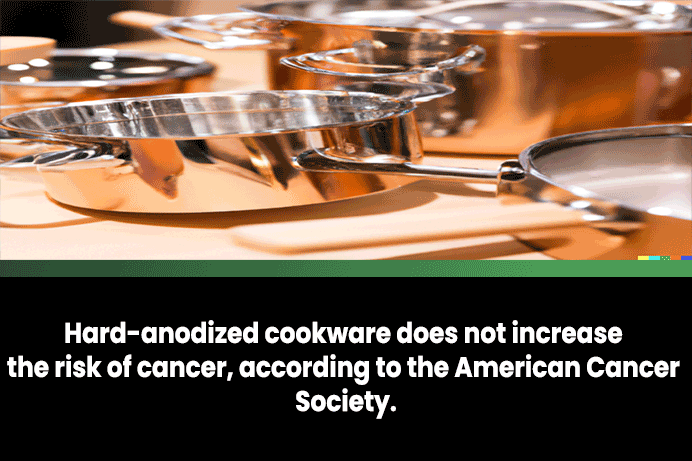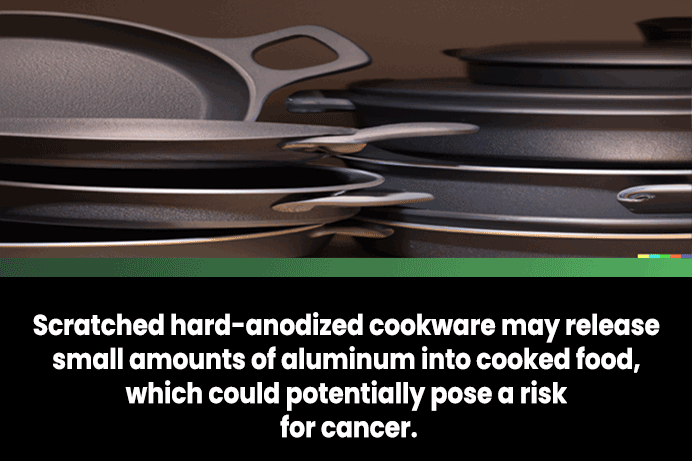Does Hard Anodized Cookware Cause Cancer? Tips To Protect Your Health
Do you worry that your dependable hard-anodized cookware might cause cancer? Recently, concerns have arisen regarding the potential health effects of various cookware types. Hard anodized cookware has specifically attracted attention in this regard. With its durability and nonstick properties, it has become a popular choice in many kitchens.
Anodized aluminum cookware is specially treated to prevent metal from seeping into food or interacting with acidic ingredients. Unlike typical lightweight aluminum cookware, which can easily react with acidic foods such as tomatoes, anodized aluminum pots and pans offer safety. Additionally, they possess non-stick properties, resistance to scratches, and effortless cleaning.
The question is is hard anodized cookware safe for cancer patients? However, a controversial claim has emerged, suggesting that using hard anodized cookware may increase the risk of cancer.
This has sparked a heated debate among consumers and health professionals, prompting a closer look at the scientific evidence and the various factors contributing to this ongoing discussion. In this article, we will explore this topic in-depth, examining the available research and shedding light on the key points to help you make informed decisions about your cookware choices.
How It Began?
Sometimes, people discover things by accident. Let’s talk about Teflon, a special coating for cooking that became really popular. In 1938, someone found Teflon by mistake, but it wasn’t until 1956 that people started using it for cooking. They called it “T-fal” when they sold it to everyone. People loved it because it made cooking easier, and the red circle in the middle of the pans told them when it was hot enough.
But, there were some problems too. People started to worry that Teflon coating might release bad stuff into their food when it was used with aluminum. Also, when it got very hot, it made some strange smoke. This made people argue about it.
Does Hard Anodized Cookware Cause Cancer?
Hard anodized cookware is a popular choice in many kitchens due to its durability and nonstick properties. However, people have raised concerns about its potential to cause cancer. It is important to understand that the best hard anodized cookware undergoes an electrochemical process, which subjects aluminum to create a hard, nonporous surface.
This process enhances the cookware’s resistance to scratches and corrosion. Although a small amount of aluminum can be leached into food, anodized aluminum cookware significantly reduces this risk. Using aluminum pots and pans does not contribute to an increased cancer risk.
The proof shows that eating aluminum might not be good for your kidneys and could make your bones weaker by taking away important stuff called phosphorus and calcium from your body. People don’t really need aluminum in their food, and because it reacts with things easily, it’s likely not good for our bodies.
Aluminum itself is generally considered safe and is even found naturally in many foods and products we consume. Here again, the question raised is anodized aluminum safe or not? So, based on current scientific knowledge, there is no direct evidence to suggest that hard anodized cookware causes cancer. Nevertheless, it is always a good idea to follow safe cooking practices, such as using utensils that won’t scratch the surface and avoiding high heat, to maintain the integrity of the cookware and minimize any potential risks.
Before you toss your hard-anodized pots and pans in the trash, look at the science behind hard-anodized cookware and its potential health risks.
Hard Anodized Cookware Health Risks
Hard anodized cookware is generally regarded as safe for cooking purposes. However, hard anodized cookware disadvantages are also to consider, it is important to consider some potential health risks associated with this type of cookware:
Aluminum Leaching
Manufacturers make hard-anodized cookware from aluminum, and there is a concern that small amounts of aluminum may leach into the food during cooking. While scientific evidence does not indicate significant health risks, it is advisable to be cautious about the potential aluminum content in the food.
Coating Wearing Off
The anodized coating on hard-anodized cookware may gradually wear off over time, which could expose the underlying aluminum metal. Prolonged exposure to aluminum is linked to certain health issues. However, it’s important to note that manufacturers design the anodized coating to be durable and resistant to wear and tear.
Scratched Surfaces
Scratches on hard-anodized cookware can expose the aluminum beneath, potentially leading to aluminum leaching into the food. To prevent this, it is crucial to handle and clean the cookware using non-abrasive materials to avoid scratching the surface.
Despite these potential risks, it is crucial to emphasize that there is no conclusive evidence linking hard-anodized cookware to significant health problems. Many people regularly use hard-anodized cookware without experiencing any adverse effects.
To minimize any potential risks, we recommend following the manufacturer’s instructions for use and care, refraining from using metal utensils that can scratch the surface, and replacing the cookware if the anodized coating becomes significantly worn or damaged.
Hard-Anodized Cookware; A Health Hazard or Cooking Masterpiece?
Hard-anodized cookware is a type of nonstick cookware that is made by treating aluminum with an electrochemical process. This process creates a hard, non-porous surface resistant to scratches, stains, and corrosion. Cooking enthusiasts often praise the resulting cookware for its durability and its ability to distribute heat evenly. One of the best examples of hard anodized cookware is T-Fal.
Hard anodized cookware offers several benefits, including its durability and resistance to scratches and chips. It is also non-reactive with acidic foods so it won’t leave a metallic taste in your dishes. Hard anodized cookware is known for its excellent heat distribution, allowing food to cook evenly and reducing the risk of hotspots. Overall, hard anodized cookware is a reliable, long-lasting option to help you achieve excellent cooking results.
Despite all these benefits, hard anodized cookware could be your hidden enemy if you do not use it properly or care for it. There might be several potential health risks of using scratched and wrapped cookware or using them at extremely high temperatures.
Is hard anodized cookware also linked to cancer? You will find your answer here:
What Are The Health Risks Associated With Hard-Anodized Cookware? Revealing the Secrets

One of the main concerns in the USA about hard-anodized cookware is whether or not it contains harmful chemicals that can cause cancer. Specifically, there has been concern about the presence of a chemical called perfluorooctanoic acid (PFOA), used in manufacturing nonstick coatings.
According to the Environmental Protection Agency (EPA), PFOA has been linked to various health problems, including cancer, reproductive and developmental problems, and liver and immune system damage. However, the good news is that many manufacturers have phased out the use of PFOA in producing nonstick coatings, including hard-anodized cookware.
In addition, the American Cancer Society has stated that there is currently no evidence to suggest that using hard-anodized cookware increases the risk of cancer. The organization also notes that the amount of aluminum that leaches into food from hard-anodized cookware is minimal and not considered a health concern.
Beware Of Scratches On Hard Anodized Cookware; It May Pose Several Health Risks

Scratched hard anodized cookware may pose a potential risk for cancer as it can release small amounts of aluminum into cooked food. When aluminum is ingested in excess, it can accumulate in the body and cause various health problems, including an increased risk of developing certain types of cancer.
Therefore, it is important to take extra care when cleaning and storing hard anodized cookware to avoid scratches or chips. If your cookware is scratched, replace it to prevent potential health risks.
Safe And Effective Tips For Using Hard-Anodized Cookware To Avoid Health Risks, Including Cancer?
While the risks associated with hard-anodized cookware are relatively low, there are still some tips you can take to ensure that you are using it safely:
1. Avoid Using Metal Utensils on Hard Anodized Cookware
Metal utensils can scratch the nonstick surface and cause it to flake off.
2. Avoid Cooking Acidic Foods At High Temperatures on Hard Anodized Cookware
Acidic foods such as tomatoes or citrus fruits acid can react with the aluminum of hard anodized cookware and cause it to leach into your food.
3. Use Non-Abrasive Cleansers on Hard Anodized Cookware
Always use non-abrasive cleaning tools and avoid stacking your cookware to prevent scratches.
4. Always Follow The Manufacturer’s Instructions
Follow the manufacturer’s cleaning and care guidelines to ensure your hard anodized cookware lasts as long as possible.
5. Avoid Scratched Hard Anodized Cookware
If you notice any wear or damage, such as peeling or scratches, stop using the hard anodized cookware immediately and replace it.
FAQs
Is it safe to use hard anodized cookware?
High-quality anodized aluminum cookware poses no health risks to its users. The aluminum’s protective layer prevents contact between the food and the metal below. Thus, leaching is not a concern, and hard anodized cookware safe to use.
Is hard anodized cookware toxic?
No, hard anodized cookware is not toxic when used properly. The anodized aluminum layer seals the surface, preventing the leaching of metals into food. Hard anodizing is an electrochemical process that creates a durable, non-stick surface safe for cooking when surface scratches are avoided.
Is hard anodized better than aluminum?
Yes, hard anodized is better than raw aluminum. The anodization process reinforces the cookware surface, preventing leaching and making it more durable, non-stick, and corrosion-resistant than untreated aluminum. Hard anodizing transforms soft aluminum into a hardened, safe cooking surface.
Is anodized aluminum toxic?
No, it is not toxic. Cookware that is made from strong anodized aluminum is very safe for cooking. The tough covering on the aluminum keeps your food safe and doesn’t let anything bad get into it. So, you can use it without any worries.
Is hard anodized cookware chemical-free?
After making it super strong, the surface is safe to use and won’t hurt you. It’s even tougher than cookware with a special ceramic coating. So you can feel happy and safe while cooking with it!
Are metal utensils safe to use on hard anodized cookware?
Anodized aluminum cookware of good quality is suitable for use in the kitchen. However, using regular aluminum or scratched anodized aluminum pans is riskier since acids in foods like tomato sauce react with the metal, increasing the amount of aluminum in the food.
Conclusion
While there has been some concern about the safety of hard-anodized cookware, the evidence suggests that the risks are relatively low. You can safely use this cookware and enjoy its many benefits by taking simple precautions, such as avoiding metal utensils and acidic foods. If you have concerns about your cookware’s safety, always consult a healthcare professional or the manufacturer.




